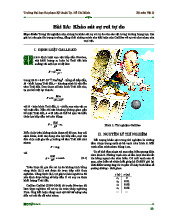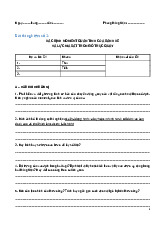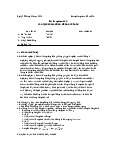


Preview text:
PHYSIC LABORATORY 1 GROUP 8
EXERCISE 6A: FRICTION FORCE (khảo sát lực ma sát)
Mục đích: Trong thí nghiệm này, ta sẽ tiến hành khảo sát sự phụ thuộc của lực ma
sát nghỉ, ma sát trược và ma sát lăn vào áp lực, diện tích và bề mặt tiếp xúc giữa vật
và mặt phẳng chuyển động.
Purpose: In this experiment, we will investigate the dependence of rest friction,
friction and rolling friction on the pressure, area and contact surface between the object and the moving plane.
Kết luận :
Quy luật xuất hiện lực ma sát của thí nghiệm sử dụng lực kế trên phụ thuộc vào nhiều
yếu tố khác nhau, bao gồm: khối lượng của vật, sự tiếp xúc và áp lực của môi trường giữa hai bề mặt.
Lực ma sát cũng là một yếu tố quan trọng trong việc chống lại lực ma sát khi vật
chuyển động và có thể ứng dụng trong nhiều lĩnh vực khác nhau. Thí nghiệm khảo
sát lực bằng dụng cụ đo lực là một trong những phương pháp đơn giản nhất để đo
lực ma sát và tìm hiểu các định luật liên quan. Conclusion:
The frictional force laws of the experiment above utilizing a force gauge are depend
on a variety of parameters, including: normal force, the weight of the item, and the
contact, and pressure of the environment between two surfaces.
The friction force is also a significant aspect in dealing with friction while moving
items and may be used in various sectors. The experiment of examining force with
a force gauge is one of the most basic methods for measuring frictional force and
comprehending the principles that govern it.
Đối tượng khảo sát:
+ Khối hình hộp có 2 mặt (mặt nhám và mặt nhựa)
CÂU HỎI KIỂM TRA
1) Nêu cơ chế xuất hiện ma sát nghỉ, ma sát trượt và ma sát lăn.
+ Ma sát nghỉ: sinh ra là do có lực tác dụng vào vật, cùng phương, cùng độ lớn
nhưng ngược chiều với lực tác dụng. Ma sát nghỉ giữ cho vật không trượt khi bị vật
vật bị tác dụng của lực khác.
+ Ma sát trượt: sinh ra khi một vật trượt trên bề mặt của vật khác. Lực ma sát trượt
luôn ngược chiều hướng chuyển động.
+ Ma sát lăn: sinh ra khi một vật lăn trên bề mặt của vật khác.
Translate to english:
+ Rest friction: generated by the force acting on the object, the same direction, the
same magnitude but opposite to the force acting. Resting friction keeps the object
from slipping when the object is under the action of another force.
+ Sliding friction: occurs when an object slips on the surface of another object. The
sliding friction force is always opposite the direction of movement.
+ Rolling friction: This occurs when an object rolls on the surface of another object.
2) Lực ma sát phụ thuộc những yếu tố nào?
Lực ma sát phụ thuộc vào áp lực giữa hai bề mặt và vật liệu ma sát.
Translate to english:
Friction depends on the pressure between the two surfaces and the friction material.
3) Miêu tả nguyên lý đo lực ma sát trong bài thí nghiệm
Ta tiến hành đo lực ma sát khi kéo một khối lượng m trên mặt phẳng nằm ngang.
Khi vật đứng yên hoặc chuyển động thẳng đều, tổng hợp lực tác dụng lên vật bằng
0, lực ma sát sẽ cân vằng với lực kéo.
Như vậy, khi vật đứng yên, lực ma sát nghỉ hoàn toàn quan sát được qua số đo của lực kéo.
Trong khi đó, lực ma sát trượt có thể quan sát qua số đo của lực kéo chỉ khi vật
chuyển động thẳng đều.
Translate to english:
We measure the friction force when pulling a mass m on the horizontal plane. When
the object is stationary or moving evenly, the combined force acting on the object is
zero, the friction force will be equal to the pulling force.
Thus, when the object is at rest, the friction force is completely observed through the
measurement of the traction force.
Meanwhile, the sliding friction force can be observed through the measurement of
the traction force only when the object is moving evenly.



